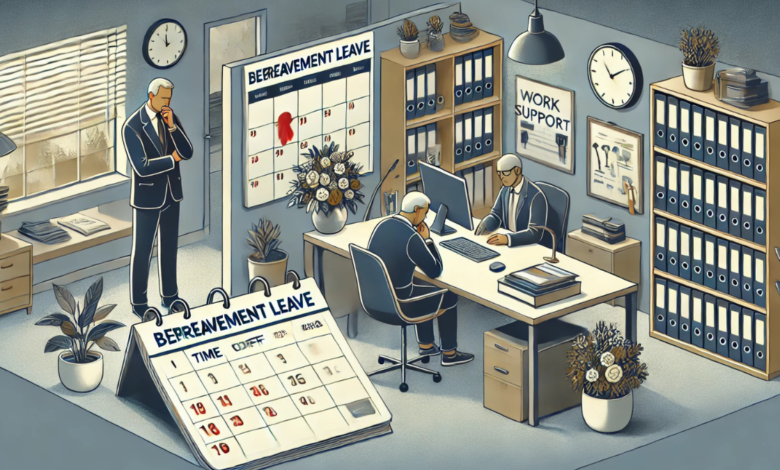Explaining Bereavement Leave: How to Balance Work and Grief

Losing a loved one is one of the most difficult experiences a person can go through. During such a challenging time, individuals are often faced with overwhelming emotions and the practicalities of dealing with a loss, including funeral arrangements, legal matters, and taking time to grieve. One aspect that can provide relief during this time is bereavement leave. Bereavement leave is a type of leave provided by employers that allows employees time off to mourn the death of a loved one and attend related activities such as funerals or memorial services.
However, balancing the demands of work and personal grief can be a challenging situation. In this article, we will explain what bereavement leave is, how it works, what you can expect, and how to balance the emotional toll of losing a loved one while handling your work responsibilities.
What is Bereavement Leave?
Bereavement leave is time off granted by an employer to an employee following the death of a close family member or loved one. The purpose of bereavement leave is to give employees time to cope with their grief, manage funeral or memorial services, and take care of other matters related to the loss.
In many cases, bereavement leave is provided with pay, though policies vary depending on the employer, company size, and local regulations. Bereavement leave is typically shorter than other types of leave, ranging from one to five days, though some companies may offer longer leave or additional unpaid time off for employees who need more time to recover.
Bereavement Leave: Common Policies and Practices
Bereavement leave policies can differ greatly from one company to another, and even by region or country. Some common policies and practices include:
- Paid vs. Unpaid Leave: Some employers offer paid bereavement leave, where employees continue to receive their regular salary during their time off. However, others may only provide unpaid leave or a limited number of paid days.
- Duration: The typical duration for bereavement leave is anywhere from 1 to 5 days, depending on the company and the employee’s relationship with the deceased. In some cases, employees may be eligible for additional leave if they require more time to cope.
- Eligibility: Bereavement leave is usually reserved for close family members, such as parents, children, spouses, siblings, and sometimes extended family like grandparents or in-laws. Some companies may even extend the benefit to pets, particularly in companies with progressive leave policies.
- Additional Support: Some companies provide additional support during bereavement, such as counseling services, flexible working arrangements, or options to extend leave, especially if the employee has additional responsibilities or requires more time for emotional recovery.
- Documentation Requirements: In many cases, employees are required to provide documentation to verify the death of a loved one. This could include a death certificate or funeral notice. However, companies may show flexibility in their requirements, especially when employees are dealing with an emotional time.
The Emotional and Practical Aspects of Bereavement Leave
While bereavement leave is intended to provide employees with the opportunity to manage their grief and funeral obligations, the emotional toll of losing a loved one can still make it difficult to return to work and resume normal tasks. Striking a balance between personal grief and professional responsibilities is often easier said than done. Below, we’ll explore some ways to manage the emotional and practical aspects of bereavement leave and how you can strike the right balance.
- Recognize the Need for Grief
Grief is a natural and individual process that varies from person to person. It can be overwhelming, with emotions ranging from sadness and anger to disbelief and confusion. During bereavement leave, it’s important to allow yourself the time and space to grieve properly. Many people mistakenly think they must immediately return to normal functioning after taking a few days off, but it’s crucial to understand that grief does not follow a timeline.
While some people may return to work after just a few days, others may need additional time to cope with their emotions. It is essential to allow yourself the time you need to process your grief and ensure that you are emotionally ready to re-engage with work tasks.
- Communicate with Your Employer
One of the key ways to balance work and grief is by maintaining open communication with your employer. Let your employer know how much time you need for bereavement leave and if additional time is necessary for emotional or practical reasons. While some employers may not offer an extended period of paid leave, many will be flexible if you communicate your needs and show the proper documentation.
If you find that you need extra time after your initial bereavement leave ends, don’t hesitate to discuss your situation with HR or your manager. Many companies are compassionate during times of loss and can offer additional leave, flexible hours, or work-from-home arrangements to accommodate grieving employees.
- Set Boundaries
Grief can sometimes feel isolating, and it’s easy to feel pressured to push through it. However, one of the most important things to remember during this time is to set boundaries that allow you to focus on your well-being. For instance, if you’re not ready to return to work or take on specific projects, it’s okay to ask for a lighter workload or extend your time off. Setting boundaries with colleagues, such as limiting communication during personal time, can also help you manage your grief in a more balanced way.
If possible, try to compartmentalize your grief to avoid feeling overwhelmed by work-related stress. Give yourself the space to feel your emotions without the constant expectation of performing at your highest level. Employers are typically understanding of personal losses, and a respectful approach to balancing personal and professional obligations can help you regain your emotional balance.
- Ask for Support and Be Honest
Returning to work after a bereavement can be emotionally challenging. Many people feel overwhelmed by their grief and uncertain about how to proceed. Don’t be afraid to ask for support. Whether it’s talking to a colleague you trust or seeking professional help through counseling services, support is essential during times of loss.
Being honest with yourself about your emotional needs can help guide you through the process. If you’re struggling, don’t feel that you must hide your emotions. The more open you are about your struggles, the more likely you are to receive the support you need from both your employer and colleagues.
- Return Gradually
If possible, consider returning to work on a gradual basis. This might involve working reduced hours, focusing on less demanding tasks, or starting with remote work if your job allows it. Returning to work too quickly can cause you to feel more overwhelmed while easing into it allows you to regain your balance at your own pace.
Employers may be willing to accommodate a gradual return by offering flexible work arrangements, so don’t hesitate to discuss this option. A phased return allows you to ease back into your professional life without sacrificing your emotional well-being.
The Legal Landscape of Bereavement Leave
https://www.google.com/url?sa=i&url=https%3A%2F%2Fhrsoftware.in%2Fblog%2Fwhat-is-bereavement-leave%2F&psig=AOvVaw2ElklaLjML2cn9WtHMtrxp&ust=1733348938129000&source=images&cd=vfe&opi=89978449&ved=0CBQQjRxqFwoTCIj3s5TKjIoDFQAAAAAdAAAAABAEIn many countries, including the United States, bereavement leave is not a federally mandated right, though individual states and local governments may have their requirements. For instance, while some states have laws requiring certain types of leave for employees, others may not provide such protections. As a result, employees may need to rely on company-specific policies for paid or unpaid bereavement leave.
In contrast, countries like the United Kingdom and Canada have more robust legal protections for bereavement leave, offering paid leave for the loss of close family members. Employers in these countries are required by law to grant bereavement leave with compensation, ensuring that employees have time to grieve without worrying about financial instability.
Conclusion
Bereavement leave is an important benefit that allows individuals to take time off from work after the death of a loved one, enabling them to manage both their emotional well-being and practical obligations. Striking a balance between personal grief and professional responsibilities can be difficult, but with open communication, proper support, and respect for your emotional needs, it is possible to navigate this challenging time effectively.
Remember that grieving is a personal process, and there is no “right” timeline for healing. Employers are encouraged to offer compassionate policies that prioritize their employees’ well-being, while employees should feel empowered to ask for the support they need.
FAQs About Bereavement Leave
- What is bereavement leave, and who qualifies for it?
- Bereavement leave is time off granted to employees following the death of a close family member or loved one. Eligibility typically depends on the employer’s policies and may vary based on the relationship with the deceased.
- Is bereavement leave paid or unpaid?
- Bereavement leave can be either paid or unpaid, depending on the employer’s policy. Some companies offer paid leave, while others may only offer unpaid time off or a combination of both.
- How long is bereavement leave typically?
- Bereavement leave usually lasts between 1 and 5 days, though some companies may offer more time depending on the employee’s needs and the nature of the loss.
- Can I extend my bereavement leave if I need more time?
- It is possible to extend bereavement leave by communicating your needs with your employer. Some companies may offer additional unpaid leave or flexible work arrangements.
- Are there legal protections for bereavement leave in the U.S.?
- Bereavement leave is not federally mandated in the U.S. However, certain states may have laws requiring employers to provide leave for the death of a family member, and some companies have their policies in place.
You May Also Read: https://businessprimex.co.uk/





